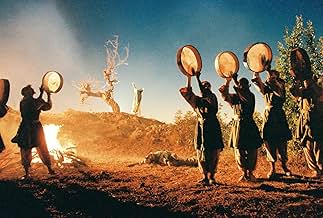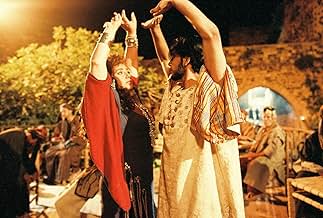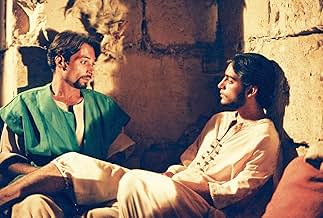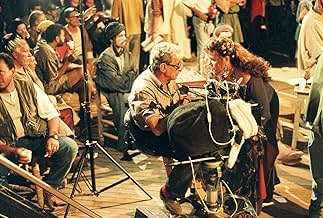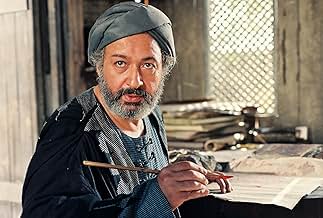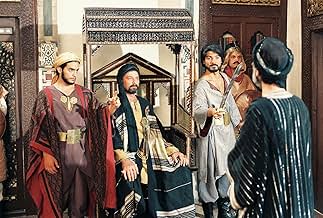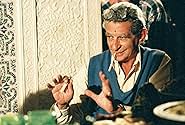Adicionar um enredo no seu idiomaThe story is set in the 12th century in Arab-ruled Spanish province Andalusia, where famed philosopher Averroes is appointed grand judge by the caliph and his liberal court judgments are not... Ler tudoThe story is set in the 12th century in Arab-ruled Spanish province Andalusia, where famed philosopher Averroes is appointed grand judge by the caliph and his liberal court judgments are not liked by everyone. The caliph's political rivals, centered around the leader of a fanatic... Ler tudoThe story is set in the 12th century in Arab-ruled Spanish province Andalusia, where famed philosopher Averroes is appointed grand judge by the caliph and his liberal court judgments are not liked by everyone. The caliph's political rivals, centered around the leader of a fanatical Islamic sect, force the caliph to send Averroes into exile, but his ideas keep on livin... Ler tudo
- Direção
- Roteiristas
- Artistas
- Prêmios
- 2 vitórias e 1 indicação no total
- Averroes
- (as Nour El Cherif)
- Al Mansour, The Caliph
- (as Mahmoud Hemeida)
- Averroes' Wife
- (as Safia El Emary)
- Nasser, The Crown Prince
- (as Khaled El Nabaoui)
- The Caliph's Brother
- (as Seif Abdel Rahman)
- Emir of the Sect
- (as Magdi Idris)
- Gaafar
- (as Hasan El-Adl)
- Direção
- Roteiristas
- Elenco e equipe completos
- Produção, bilheteria e muito mais no IMDbPro
Avaliações em destaque
That was Al Massir, or the Destiny of Youssef Chahine. After his previous movie "El Mohager", Chahine was taken to court by a fundamentalist lawyer who claimed that Chahine presented the prophet Joseph in this movie and this is something forbidden "To show prophets on the screen" by Al Azhar. The lawyer wanted the court to stop showing the movie on the Egyptian screens as well as its distribution outside Egypt.
Regardless of the final conclusion of the court, this case was the major motive behind the script of "Al Massir". Jo (Chahine) wanted to send a clear message to this people "You can never stop ideas from reaching the people, neither by burning the books (last scene of the movie), nor by forbidding movies, etc....' As usual, Averoes in this movie was Chahine himself. Trying to keep a good balance between what the history says about Averoes and what Chahine wanted to reflect on this character, he chose his characters to include all the contradictions he wanted to show. Politics, philosophy, love, integrism, etc.... they are everywhere. This idea of combining Islam with Terrorism bothers Chahine, that is why he started the movie with the french religious authorities burning a man who "Translated the books of this Averoes", so don't you be surprised when Muslims burn "Only" the books of Averoes. This analysis of Chahine is what really makes the movie special. It was expected after what happened to him in his last movie (as I said in the beginning), he could have just make it a good reason for a movie showing Muslims as Terrorists, an easy way to attract a Western spectator. But Jo chose the hard way to do it, showing that among all this terrorism, people are still "Life lovers" as mentioned by the first song. These people who just love their life were those fighting against terrorist - not with weapons - but with love. "We have to know first why they are doing this', said Averoes. Actors were really good specially Nour Elsherif, Mahmoud Hemeida, Khaled Elnabawi and Ahmed Fouad Selim. Mohamed Mounir is as usual the voice of Chahine singing "Sing out loud, we still can sing".
The story is set in medieval Moorish Spain, about the conflict between Averroes; a historical humanistic Muslim philosopher; and a group of reactionary fundamentalists. It is very well acted and the characters are sympathetic as well as credible. Often forgotten is that many of the Islamic societies of the Early Middle Ages (particularly in Spain) were ahead of Europe in science, mathematics, medicine, religious tolerance and many intellectual pursuits. But, there were periodic and sometimes serious conflicts with those who resented these trends.
This is not just an historical epic. The Egyptian director, a very courageous man named Youssef Chanine, deliberately molded the script to show how fanaticism undermines not only a society's intellect, but destroys it's soul. Particularly disturbing, but highly relevant to our times, is showing the subtle manner in which young men are recruited into these movements and about how empty and dishonest they turn out to be.
Although the population of medieval Andalusia was 10-15% Jewish and Averroes had extensive contact with both Jewish and Christian intellectuals, there isn't a Jew in sight and the only Christians are depicted as evil, fanatical, external enemies who enter into a secret pact with the fundamentalist cult. While this is not entirely accurate and a gross simplification of the actual situation at the time, I don't fault Mr. Chanine. He has endured extreme legal harassment in the Egyptian courts over this and another film as well as extensive death threats against himself and his family. Merely exploring the themes portrayed in this movie has put his head on the chopping block, and any sympathetic depiction of Jews or Christians would have resulted in the banning of the film and possibly his head rolling into the basket. He deliberately crafted this film to educate his own society about the debasement and moral corruption wrought by cultism and violence, and, no doubt, wanted to make sure the message got out.
A bold, and gently provocative film by a very brave man.
Você sabia?
- CuriosidadesAccording to an interview actor Nour El-Sherif stated that the role of Ibn Roshd was supposed to be played by director Youssef Chahine himself, but Nour told him that he was not suitable for the role.
- Citações
Caliph's brother: Thoughts have wings. No one can prevent them from flying.
- ConexõesFeatured in Humbert Balsan, producteur rebelle (2006)
- Trilhas sonorasAlli sotak
and "Gamr el Hawa", words by Sameh El Kodoussi and Kawssar Mostapha, music by Kamal El Tawil
Performed by Mohamed Mounir
Principais escolhas
- How long is Destiny?Fornecido pela Alexa
Detalhes
- Data de lançamento
- Países de origem
- Idiomas
- Também conhecido como
- Destiny
- Locações de filme
- Krak des Chevaliers, Syria(sect training grounds)
- Empresas de produção
- Consulte mais créditos da empresa na IMDbPro

